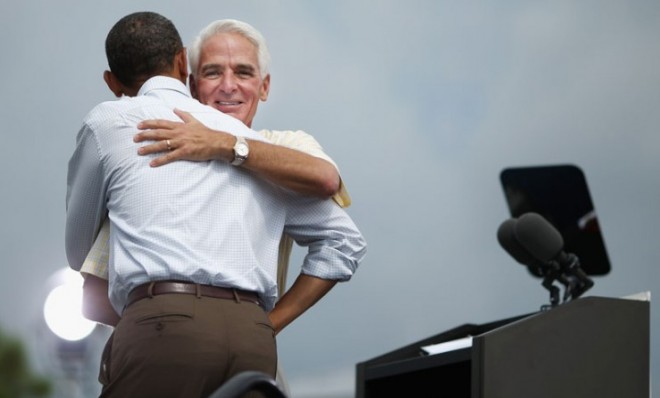Charlie Crist's party switch: Is the GOP better off without him?
The former Florida governor joins the Democrats, which could make it harder for Republicans to appeal to moderates


Former Florida Gov. Charlie Crist has had quite the political history: He served the state as a Republican and made a failed 2010 Senate bid as an independent, after his Tea-Party-backed rival for the GOP nomination took the lead. Now he has officially joined the Democratic Party. Crist posted a photo on Twitter showing himself holding voter registration papers, and wrote, "Proud and honored to join the Democratic Party in the home of President @BarackObama!" He said on Monday that he didn't feel "comfortable" in the GOP any more, saying party leaders had driven him and other "middle of the road" Republicans away with far-right policies on "immigration, education, voter suppression," and other issues. "I didn't leave the Republican Party, the Republican Party left me," he said, echoing Ronald Reagan's explanation for his decision to leave the Democrats. In the wake of a rough election, will Crist's departure further dampen the GOP's appeal to moderates, or is the party better off without him?
Crist could help Democrats win back the Florida governorship: "The news hardly comes as a surprise," says Steve Benen at MSNBC. Crist has been a politician in search of a party ever since "the Republicans' purge of moderates" in 2010, and he endorsed President Obama this summer. It's not hard to figure out where he's headed. With Crist on their side, Democrats finally have a "high-profile candidate" who'll be up to the task, in 2014, of beating Florida Gov. Rick Scott (R), who "has struggled badly."
"Crist's evolution is complete"
The Week
Escape your echo chamber. Get the facts behind the news, plus analysis from multiple perspectives.

Sign up for The Week's Free Newsletters
From our morning news briefing to a weekly Good News Newsletter, get the best of The Week delivered directly to your inbox.
From our morning news briefing to a weekly Good News Newsletter, get the best of The Week delivered directly to your inbox.
The GOP is better off without RINOs like Crist: "Self-proclaimed moderates" like Crist don't care about defending conservative values, says blogger Streiff at RedState. They're out to puff themselves up, which is why as soon as they lose a primary "they quit because 'the Republican party left me.'" The more of these "Quislings" who leave the better, because without them maybe true conservatives won't get "crapped upon by having our beliefs denigrated in the name of electability."
"Annoying Orange. Charlie Crist becomes a Democrat"
Crist is an easy target for Republicans, but he's still a problem: "To be sure, Crist, who served as an Obama surrogate and spoke at the Democratic National Convention, has set himself up as an ideal foil for Republicans both in Florida and nationally," says Patrik Jonsson at The Christian Science Monitor. Still, he's generating headlines that won't do his former team any good. His loud departure "still highlights a central GOP post-election conundrum: How to become more, not less, appealing to middle America."
"Charlie Crist joins the Democrats: What drives a political chameleon?"
A free daily email with the biggest news stories of the day – and the best features from TheWeek.com
Harold Maass is a contributing editor at The Week. He has been writing for The Week since the 2001 debut of the U.S. print edition and served as editor of TheWeek.com when it launched in 2008. Harold started his career as a newspaper reporter in South Florida and Haiti. He has previously worked for a variety of news outlets, including The Miami Herald, ABC News and Fox News, and for several years wrote a daily roundup of financial news for The Week and Yahoo Finance.
-
 Political cartoons for January 25
Political cartoons for January 25Cartoons Sunday's political cartoons include a hot economy, A.I. wisdom, and more
-
 Le Pen back in the dock: the trial that’s shaking France
Le Pen back in the dock: the trial that’s shaking FranceIn the Spotlight Appealing her four-year conviction for embezzlement, the Rassemblement National leader faces an uncertain political future, whatever the result
-
 The doctors’ strikes
The doctors’ strikesThe Explainer Resident doctors working for NHS England are currently voting on whether to go out on strike again this year
-
 The billionaires’ wealth tax: a catastrophe for California?
The billionaires’ wealth tax: a catastrophe for California?Talking Point Peter Thiel and Larry Page preparing to change state residency
-
 Bari Weiss’ ‘60 Minutes’ scandal is about more than one report
Bari Weiss’ ‘60 Minutes’ scandal is about more than one reportIN THE SPOTLIGHT By blocking an approved segment on a controversial prison holding US deportees in El Salvador, the editor-in-chief of CBS News has become the main story
-
 Has Zohran Mamdani shown the Democrats how to win again?
Has Zohran Mamdani shown the Democrats how to win again?Today’s Big Question New York City mayoral election touted as victory for left-wing populists but moderate centrist wins elsewhere present more complex path for Democratic Party
-
 Millions turn out for anti-Trump ‘No Kings’ rallies
Millions turn out for anti-Trump ‘No Kings’ ralliesSpeed Read An estimated 7 million people participated, 2 million more than at the first ‘No Kings’ protest in June
-
 Ghislaine Maxwell: angling for a Trump pardon
Ghislaine Maxwell: angling for a Trump pardonTalking Point Convicted sex trafficker's testimony could shed new light on president's links to Jeffrey Epstein
-
 The last words and final moments of 40 presidents
The last words and final moments of 40 presidentsThe Explainer Some are eloquent quotes worthy of the holders of the highest office in the nation, and others... aren't
-
 The JFK files: the truth at last?
The JFK files: the truth at last?In The Spotlight More than 64,000 previously classified documents relating the 1963 assassination of John F. Kennedy have been released by the Trump administration
-
 'Seriously, not literally': how should the world take Donald Trump?
'Seriously, not literally': how should the world take Donald Trump?Today's big question White House rhetoric and reality look likely to become increasingly blurred
